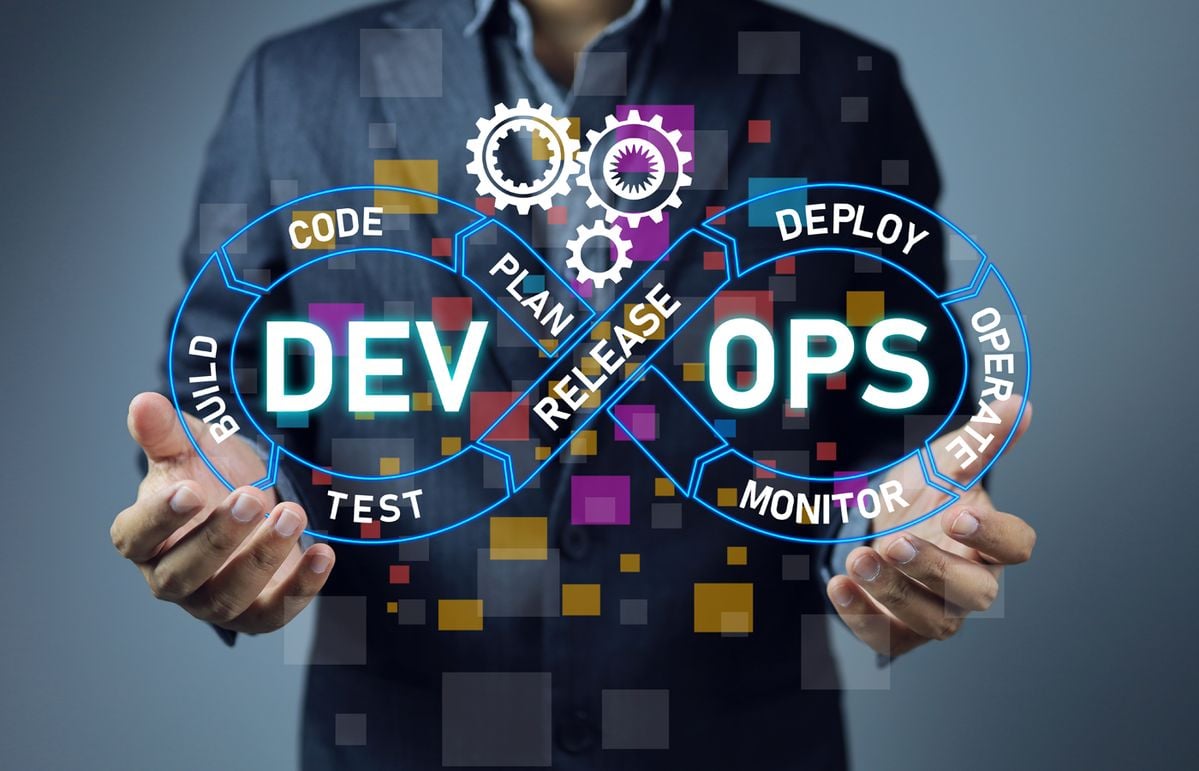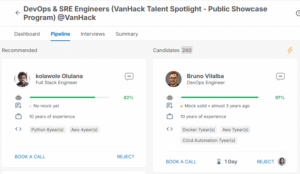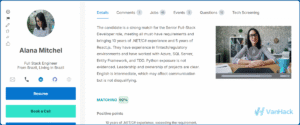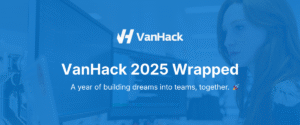Finding skilled DevOps engineers is a top priority for startups aiming to grow. These professionals ensure your infrastructure stays reliable, your product launches quickly, and your business scales effectively. This guide walks you through the steps to hire the right talent, from understanding market trends to using modern tools for evaluation. Ready to build your team? Start recruiting with Vanna today.
Why DevOps Engineers Matter for Your Startup’s Growth
DevOps engineers connect development and operations teams, making sure code moves smoothly from creation to deployment while keeping systems stable and secure. For startups, their role is essential to stay competitive and scale without hiccups.
What DevOps Really Means for Your Business
DevOps engineers handle continuous integration and delivery, automate infrastructure, monitor systems, integrate security, and work across teams. They build the backbone for fast, dependable software releases while maintaining high operational standards. Their skills directly speed up product development, improve system uptime through active monitoring, and support scalable setups as your startup grows. They also strengthen security by embedding safe practices into deployment processes.
The Risks of Hiring the Wrong Person
Unstable systems from poor DevOps practices can drive customers away, cut revenue, and harm your reputation. Slow deployment processes drag out development timelines and weaken your market position. Security gaps in infrastructure can lead to legal or financial trouble. Waiting too long to hire the right talent adds technical debt, which becomes costlier to fix as your company scales. The downside of missing out on skilled DevOps support often outweighs the cost of hiring well.
Navigating the DevOps Talent Market in 2025
Finding DevOps talent is tough for startups, with demand far exceeding supply at every experience level. Standard hiring methods often fail to pinpoint the specialized skills these roles require.
Understanding DevOps Roles and Experience Levels
DevOps positions vary by responsibility. Staff and Principal engineers stand out for their ability to shape architecture, guide teams, and align tech with business goals. Senior engineers, with 5 to 8 years of experience, focus on refining systems. Staff-level roles design broader solutions, while Principal engineers drive long-term strategy. Compensation differs by region and expertise. North American startups can gain an edge by hiring globally from regions like Latin America or Eastern Europe, where skilled professionals often have lower salary expectations. Equity packages also play a key role in attracting experienced candidates.
Exploring Global Talent and Remote Opportunities
Remote work has opened doors to DevOps talent worldwide, though it has also raised competition and salary demands. Startups now look beyond local markets to regions like Latin America, Eastern Europe, and Asia. These areas offer skilled engineers at competitive rates, thanks to strong technical education and established software development communities.
Why Old Hiring Methods Don’t Work
General job boards flood you with unqualified applications, wasting time on sorting. Many traditional recruiters lack the technical know-how to assess DevOps skills or cultural fit. Early-stage startups often don’t have the internal expertise or connections to hire for these complex roles. Modern DevOps needs detailed evaluations of infrastructure, automation, and operations, which go beyond simple resumes or basic interviews.
Creating a Practical DevOps Hiring Plan for Startups
Hiring DevOps talent calls for a clear plan that weighs technical skills against cultural fit. This ensures candidates can handle the job and adapt to a fast-moving startup setting.
How to Test Technical Skills Effectively
Move past resumes by verifying skills early. Video introductions help gauge communication and language ability, key for distributed teams. AI-driven technical interviews offer insight into problem-solving and clarity in explaining ideas, with flexible review options. Evaluations should test Infrastructure as Code, automated pipelines, and data privacy practices. Practical tests can include designing systems, automating setups, simulating incident recovery, and securing processes. Tools like Qualified.io and HackerRank provide coding challenges and live interviews for objective, tailored assessments.
Evaluating Leadership and Strategic Thinking
For senior DevOps roles, look beyond technical tasks. Experienced engineers excel at simplifying complex issues and predicting wider impacts. Assess how they lead discussions, manage uncertainty, and influence others. Focus behavioral reviews on adaptability, teamwork, ownership, and communication across technical and business areas. Cultural fit matters to ensure they succeed with limited support and high independence. Key traits for senior hires include proven expertise, strategic planning, mentoring ability, and driving complex projects.
Should You Build or Outsource Hiring Capabilities?
Startups must decide whether to create an in-house recruiting team or partner with experts. Building internally takes time, technical knowledge, and strong networks. For many growing companies, specialized partners cut hiring time with their experience and pre-screened candidates. Weigh your hiring volume, internal resources, costs, and need for speed. Many early-to-mid-stage startups mix external support with gradual internal growth.
Leveraging AI and Global Platforms for DevOps Hiring
Today’s hiring needs smart tools like AI alongside access to worldwide talent. These solutions help startups build technical teams quickly and effectively.
How AI Speeds Up Candidate Matching
AI simplifies the hardest part of recruiting by finding qualified candidates fast. Vanna, VanHack’s AI tool, matches job needs with over 500,000 tech profiles worldwide, focusing on context and technical details. It delivers a shortlist of 3 to 5 pre-screened candidates, saving hours of manual review. Automation pushes top matches forward, cutting hiring time. Detailed vetting includes video intros for communication checks, scored coding tests, and recorded AI interviews with transcripts for thorough evaluation.
Gaining Access to Pre-Screened Senior Talent
Pre-vetted talent pools skip the heavy lifting of initial screening. Candidates are tested for skills, communication, and experience before joining the pool, reducing workload for hiring teams. Direct hire options ensure they join as full team members, not contractors, supporting long-term growth. Connect with Vanna today to see how AI matching streamlines DevOps hiring.
Making International Hiring and Relocation Easy
Hiring globally involves handling visas, housing, and integration. Full-service support manages these details, easing the process for both startups and candidates. This includes visa help, relocation logistics, and ongoing assistance. Immigration advice comes built-in, simplifying legal steps for companies without expertise. Community support after hiring helps relocated staff settle in. Accessing international markets also means tapping into cost-effective talent pools, stretching budgets further as demand for DevOps skills grows.
Key Strategies and Common Mistakes to Avoid
Even seasoned teams face hurdles when hiring DevOps talent. Recognizing these issues helps refine your approach and allocate resources wisely.
Calculating Financial and Operational Returns
Traditional recruiting fees for senior DevOps roles can top $30,000 per hire, straining startup budgets. Subscription models, like VanHack’s $3,000 monthly plan, offer unlimited hires at a fixed cost, ideal for growth phases. Delays in hiring slow development, increase system issues, and hinder market response. Consider time-to-productivity, retention, and team speed when measuring returns.
Finding the Balance Between Speed and Quality
Rushing to fill roles can lead to weak vetting and bad hires. Yet, lengthy processes risk losing candidates to quicker competitors. Use tech-driven assessments to maintain standards while speeding up timelines. Run multiple evaluation steps at once, like AI screening and structured interviews, to shrink 4-to-6-week cycles into 2 to 3 weeks without cutting corners.
Improving the Candidate Experience
Top DevOps talent judges employers as much as they’re judged. Clear, respectful hiring processes reflect your company’s efficiency. Poor experiences hurt your reputation and lower acceptance rates. Keep communication open, share timelines, provide feedback, and avoid delays. Tools for direct contact and easy scheduling make the process smoother for everyone.
Ensuring Strong Post-Hire Integration
Hiring doesn’t end with an offer. Integration is vital, especially for remote or relocated hires without local ties. Community initiatives boost retention and satisfaction. Structured onboarding clarifies culture, standards, and expectations, setting new hires up for success with defined goals and growth paths.
Advanced Challenges for Experienced Teams
Even well-resourced startups with strong leaders face nuanced hiring obstacles that need careful planning to overcome.
Overcomplicating the process can slow decisions and frustrate candidates. While thorough checks matter, overthinking leads to missed chances. Unrealistic job scopes, blending too many specialties, narrow the talent pool and often yield poor matches. Clear roles improve sourcing. Misaligned stakeholders on requirements cause inconsistent evaluations and delays. Set defined criteria and decision roles early. Underestimating global hiring complexities risks compliance issues and extra costs. Expert mobility support reduces these risks. Ignoring employer branding limits appeal to passive, high-caliber candidates. Invest in technical content and employee advocacy to draw attention.
Common Questions About Hiring DevOps Engineers
How Long Does It Take to Hire a Senior DevOps Engineer in 2025?
Filling senior DevOps roles typically takes 45 to 90 days with standard methods, depending on company size, pay, and location needs. AI platforms with pre-vetted global talent can shorten this. Longer timelines stem from the niche skills required and fierce market competition. Faster hiring comes from strong pay, clear job roles, smooth interviews, and access to international candidates.
How Does AI Help Hire Specialized Roles Like DevOps?
AI cuts down time spent on finding and screening candidates for DevOps roles. It matches job needs with profiles using detailed algorithms, spotting relevant experience. Recorded AI interviews assess problem-solving and communication, allowing flexible team reviews. Objective scoring reduces bias and keeps standards consistent across candidates.
What Are the Advantages of Hiring International DevOps Talent for Remote Roles?
Hiring globally connects you to markets with solid tech training and experience at lower costs. Regions like Latin America and Eastern Europe have strong development communities, producing skilled engineers familiar with current tools. Time zones in Latin America align with North American hours, while European hires extend coverage. Diverse backgrounds add unique perspectives, strengthening teams. Cost savings also allow access to senior talent within tighter budgets.
How Can I Verify Quality and Fit for International DevOps Hires?
Ensuring quality in global hires means thorough vetting of skills, communication, and cultural alignment. Video intros reveal language and clarity for remote work. AI interviews show technical depth and problem-solving style. Assess fit by looking at adaptability, teamwork, and values over location. Past remote work references offer insight. Short trial projects can confirm capability before final commitments.
What Costs Come with Hiring DevOps Engineers, and What’s the Return?
Hiring costs include agency fees, often 20 to 30 percent of first-year pay, plus internal time, tool subscriptions, and onboarding. For senior roles above $120,000, costs can hit $35,000 traditionally. Returns show in faster deployments, less downtime, better security, and team efficiency. A capable engineer often offsets hiring costs in 3 to 6 months through operational gains. Subscription recruiting models lower upfront expenses during scaling.
How Does VanHack’s Vanna Differ from Standard Recruiting Agencies?
Vanna stands out with AI matching, a pre-vetted global pool, and flat $3,000 monthly pricing for unlimited hires, unlike agencies charging 20 to 30 percent per hire. It offers shortlists of 3 to 5 candidates with videos, scored tests, and interview recordings. VanHack also supports global hires with visa and relocation services, often missing from traditional agencies, ensuring predictable costs and quicker hires.
Conclusion: Build Your DevOps Team with VanHack’s Vanna
Hiring DevOps engineers is a vital step for startups looking to grow. Modern strategies blend global talent access, AI tools, and detailed vetting to outpace older methods in speed and quality. Success hinges on balancing technical skills with cultural fit, tapping diverse talent pools, and using technology to streamline hiring. Startups that get this right build stronger teams and move faster in the market. Ready to strengthen your DevOps lineup? Start with Vanna now to find skilled talent and fuel your growth.



